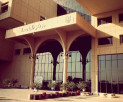‘Don’t mention the torture’
‘In contrast with 2012, there were no executions for sorcery during the year [2013]’. This is a rather odd statement to find in a country report from the US State Department. One might almost smile. That same year, again in contrast with 2012, ‘there were no judicially administered amputations … There was one execution by beheading’. However, in 2013 there were credible reports of torture that, in one instance, led to the execution of seven men. It was accepted that flogging was a legitimate judicial punishment.
If I add some information to the fact in the report that ‘Women risk arrest for driving in a private vehicle driven by a male who is not an employee … or a close male relative’ – namely, that a woman cannot have a driver’s license – many people would correctly guess that the document is about Saudi Arabia.
On 11 May, the president of our university signed a memorandum of intent with the rector of King Saud University. The details aren’t on our website yet, but the negotiations must have been fascinating. Would it have been polite to mention the well-publicised allegation that, last year, one of the female students of the university (their official website in English uses the term ‘girls’ a lot) died of a heart-attack as the male paramedics were delayed access to a woman-only campus? Perhaps not.
In any event, if this is true, it may have been due to a bad judgement call by one or two university staff. By contrast, what was almost certainly discussed at some stage is the relevance to Groningen co-operation of article 13 of Saudi Arabia’s ‘Basic Law of Governance’: ‘The aim of education is to implant the Islamic Creed in the hearts of all youths.’ There is a difficult path to tread here between cultural difference and the fact that Saudi Arabia punishes what it perceives as dissident Islamic believers (not to mention followers of other religions).
The state can do this through the power of the dictatorship that established and ultimately controls King Saud University. The institution is a not a semi-autonomous body such as Groningen: the day before he signed the memorandum in Groningen, rector Al-Omar repeated his praise of the wise leadership of his country.
When we signed the document, we signed a contract with an organisation that is part of a system where one man’s court testimony counts for those of two women. It is only right and proper that if some of our staff visit Saudi Arabia that, for example, they do not bring alcohol out of respect for local culture and ethics and that dress codes are respected, but we had better not send any ‘gays, tomboys [or] emos’ as they are banned from schools and universities by a 2012 decree. Once more, this wording is almost comic, but the reality behind it is one where gay people can be punished by flogging or death (and note that in 2013, more than 70% of the prison population were non-citizens).
This puts Groningen in a delicate position. On the one hand, there is politeness: it is never good manners to mention torture over dinner, to be seen wiping your hand discreetly. On the other hand, failing to provide a clear condemnation of central parts of Saudi society is an insult to the visitors: concealing our repulsion for widespread and flagrant human rights violations is condescending to part of a civilisation that has a long history of scholarship and moral reflection.
The staff and students of King Saud University are not naïve children or primitives, but members of an institution with a considerable academic reputation that must be filled with talented people. I imagine that the memorandum recognises this and that it explicitly rejects any endorsement by Groningen of dictatorship, state violence, gross sexism and the capital punishment of social and political dissidents.
John Flood is lecturer and coordinator of the Modern Literature section at the Department of English Language and Culture at the RUG.






